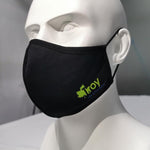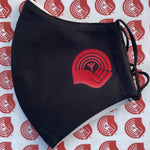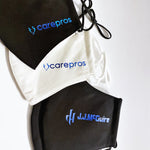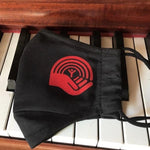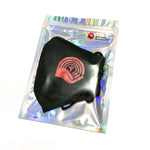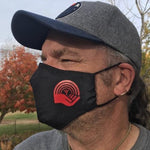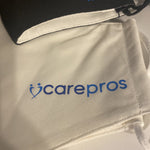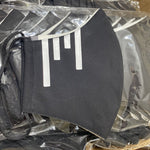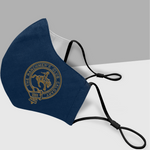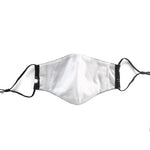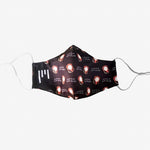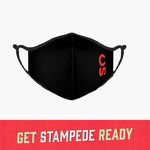FAQ
Frequently Asked Questions About Face Masks
For the duration of the pandemic, you should endeavour to wear a face mask when you’re at work, in a public place, or exposed to others. The municipal Government in each city works with the provincial or state government to effectively establish face mask laws by region or city based on advice from the Minister of Health and rate of active covid-19 cases in the area. To check whether or not face masks are mandatory in your city please visit your cities officially government website. However please note in regions where mandatory face mask bylaws are still not passed, many businessess will not allow entry without a face mask and it remains the owners right and responsibility to decide whether or not you are allowed in their establishent withouot a mask.
The CDC’s new guidance encourages individuals to wear reusable cloth masks or face coverings in public settings like retail & grocery stores, restaurants, hair salons & barber shops, airports while travelling an on planes; we’re all adapting to this as a society.
Most businesses such as restaurants, retail stores, malls, hair salons, barber shops, and others have made face masks mandatory some will provide a disposable face mask for customers who show up without a mask, while supplies last.
Disposable face masks are horrible for our planet and for the environment. Using multiple disposable face mask numerous times daily as you enter various businesses only to throw them out when you leave, is not only wasteful to our environment but also disrespectful to the businesses who have to continue purchasing them. The majority of these businesses have been closed for the duration of the pandemic and are struggling financially. Don't be that person, get yourself one or two reusable cloth masks and wear the same mask all day.
Importantly, wearing a mask can prevent you from unknowingly spreading disease in public if you are infected but asymptomatic. You can read more and reference the CDC’s latest guidance at their website here: https://www.cdc.gov/media/index.html
Yes. Starting Monday, April 20, the Government of Canada Minister of Transport has announced that all travellers must have a mandatory face mask or face covering large enough to cover their mouth and nose during their travel through Canadian airports and in-flight. The Peoples Mask complies with Transport Canada standards for reusable cloth face masks and will allow you to pass thru airport security and board your flight without any unnecessary delays.
For marine, rail or motor carrier/bus travel, travelers are encouraged to wear cloth masks whenever possible.
For more information, visit: New measures introduced for non-medical masks or face coverings in the Canadian transportation system (Transport Canada).
The Peoples Mask can be worn all day as long as it does not become damaged, damp, or dirty.
Remove your mask with clean hands when you are safely able to do so, and wash your hands with soap and water again after.
It is important to note that:
The Peoples Mask can be re-used throughout the day if clean and intact – with clean hands, fold the mask in half so that the outer surface is inwards (so that the outer surface is not contacting anything during storage) and place it in a clean, sealable bag until ready to use it again the same day.
The Peoples Mask should be placed directly into the washing machine.
You can place The Peoples Mask in a plastic bag for a short time to transport it home to launder.
Do not place your used mask into your pocket!
Do not share your mask with others!
• If you are sick:
If you are coughing or sneezing, wear a cloth mask to protect people around you from getting sick. This is very important if you go to an appointment, clinic, or a hospital. Do not go to other public places when you are sick, even if you are wearing a mask. If you are seeking medical care, an appropriate medical/surgical mask will be given to you. Follow the instructions given to you in the health care. setting about how to remove and store your cloth mask while you are there.
• If you are not sick and are going to a public place (e.g., grocery store or pharmacy): If you are going to a place where physical distancing measures are difficult to maintain (such as the grocery store, pharmacy, or public transit), Ottawa Public Health asks residents to consider wearing a cloth mask, as they may offer some additional protection to those around you.
• If you are caring for someone who is sick:
If you are taking care of someone who is coughing or sneezing, particularly if they are unable to wear a mask, wear a cloth mask when you are close to them. The. person you are taking care of should also wear a cloth mask.
Cloth masks should not be placed on:
• Children under the age of 2
• Anyone unable to remove the mask without help.
• Anyone who has trouble breathing or is unconscious.
A face shield is NOT a substitute for wearing a face mask as it does not filter respiratory droplets.
In places like Toronto where face masks are mandatory a face shield will not meet the standards required by the bylaw and you will be fined for not wearing a face mask or cloth face covering.
A face shield may provide additional protection for the wearer against droplets expelled from another person, however these droplets may still be inhaled around the shield. Respiratory droplets expelled by the wearer may escape around the sides of the face shield, which therefore provides less protection to others.
If you choose to wear a face shield, we recommend - if possible - to wear it in addition to a properly fitted cloth mask.
The Peoples Mask is fully washable and reusable. Face masks can be machine laundered at home using hot water and regular laundry detergent, or by your commercial laundry service provider in open pocket washer/extractors. Do not launder in commercial tunnel washers.
You can increase your risk of infection if you touch your face more frequently while readjusting your face mask or if you do not wash your hands before putting it on and taking it off. All parts of cloth face masks can become contaminated by breathing or when touched by your hands.
Cloth face masks become contaminated, especially when touched by your hands. When taking off a cloth face mask, follow these steps:
• After washing your hands, remove your face mask by pulling the ties or ear loops away from your ears.
• Put the mask directly into the washing machine, or in a bag that can be emptied into the washing machine. Throw out the bag after you have used it to store used masks. If the bag is washable you can wash it with your mask.
• Wash your hands again after removing your mask. Wash the masks with other laundry using a hot cycle. When washed alone the ties / straps may become tangled prevent this by washing with other laundry or tying the straps into a bow prior to wash.
• For hand washing, use laundry detergent and water as hot as you can stand, then dry thoroughly.
• We have discovered that the dishwasher is an excellent way to wash your face mask. Dishwashers reach higher temperatures than washing machines and don't toss your mask around causing unnecessary wear on the material. YES we put laundry detergent tabs in a dishwasher and it worked!
• Make sure to remove and discard the filter before washing.
• When discarding damaged or worn out masks, drop them in a lined garbage bin. Do not leave any discarded masks in places where others can come in contact with them such as shopping carts, public seats, bus stops, or on the ground.
• Cloth face masks can be re-used throughout the day if clean and intact – with clean hands, fold the mask in half so that the outer surface is inwards (so that the outer surface is not contacting anything during storage) and place it in a clean, sealable bag until ready to use it again the same day
Continue physical distancing and wash your hands often.
If you wear glasses, you may also wear a mask. Wash your hands before adjusting your glasses.
You may need to put the mask on without wearing your glasses to ensure the mask is seated well over your nose. Put your glasses on a clean surface and ensure your hands are clean when putting your glasses back on. If your glasses are fogging this is happening because the mask isn't pulled up high enough on your nose meaning you are not wearing it properly or it doesn't fit you.
For individuals who wear glasses with their masks additional precautions should be taken. Avoid touching your glasses when wearing your mask. However, if you need to readjust your glasses ensure you wash your hands immediately before and after touching them. OPH recommends taking off your glasses prior to safely taking off your mask. Take off your glasses when you can perform proper hand hygiene, and ensure your glasses can be washed with soap and water to decrease potential spread of COVID-19.
While lysol may be great for sanitizing hard surfaces or cleaning towels and bedding, lysol and/or bleach is not a recommended cleaning agent for face masks—even in a diluted solution.
"Lysol, bleach or other chemical cleaning solutions should not be used on a face covering as it would be inhaled, which could cause health problems," said Gallahue.
That means no Lysol spray or Clorox wipes either.
Ensure you wash your hands before and after removing your mask, or anytime you wish to adjust your mask without removing it. You should take off your mask when:
You are safely able to (when physical distancing can be maintained) and the mask can be placed in a lined garbage bin if it is not reusable, in a plastic bag for a short time while transporting it home, or directly into the washing machine, it becomes damp or dirty and you can exchange it for a new one if you are still in a situation where you need to wear a mask.
Wearing a face mask is not a replacement for physical distancing, hand washing and monitoring your health. Staying two metres away from people you don’t live with is important but isn’t always possible in public spaces. Wearing a mask adds an extra layer of protection, especially for others in case you have COVID-19; it may also help reduce your risk in case others have COVID-19.
For more information about non-medical masks, visit Ottawa Public Health’s website and Health Canada's website.
The Peoples Mask was designed for ALL people and developed with everyone in mind.
Our Adult Reusable Face Mask with ties is fully compatible to fit over top of your turban, hijab, nijab or burqa as the adjustable straps tie behind your head and don't us your ears for support.
Shop face masks for Sikhs Made in Canada.
Filters
Our pm2.5 face mask replacement filters
are reusable and can last up to 60 hours of continuous use or until they become damp / soiled. They should not get wet and therefore cannot be washed. It’s best to remove them prior to washing your mask.
Filti filters are single use disposables that should be thrown out after each use.
No pm2.5 do not contain graphene, the carbon layer is an activated carbon made from organic raw materials to filter air naturally while graphene is a chemical. The other layers are meltblown polypropylene.
A. BFE stands for Bacterial Filtration Efficiency. This test evaluates how well a surgical mask can prevent biological particles from being expelled by the wearer into the environment. Bioaerosol particles generated during the BFE test are “large,” on the order of 1 to 5 microns in size. For comparison, particles used for respirator filter efficiency tests are much smaller,
approximately 0.3 microns MMAD in size. The BFE test is a relative indicator of the performance of a medical, surgical or patient care mask, but the results cannot be compared to respirator certification filtration efficiency.
N95 Respirators
A. An air-purifying, particulate respirator is a personal protective device designed to help reduce the wearer’s inhalation exposure to certain airborne particles. N95 is one of nine filter classifications in the National Institute for Occupational Safety and Health (NIOSH) approval system. The Occupational Safety and Health Administration (OSHA) requires respirators be certified by NIOSH. In the NIOSH classification system, particulate respirators are given an N, R, or P rating. Each particulate respirator is also given a filter efficiency rating of 95, 99, or 10 when tested against particles that are the most difficult size to filter –
approximately 0.3 microns in size mass median aerodynamic diameter
(MMAD). NIOSH class 95 particulate respirator filters are certified to
be at least 95% efficient; class 100 particulate respirator filters are
certified to be at least 99.97% efficient. The most commonly used respirator in healthcare settings is an N95 filtering facepiece respirator. This class of respirator has an assigned protection factor (APF) of 10, which in essence means it will reduce contaminant exposures by a factor of 10. The APF defines the workplace level of respiratory protection that a respirator or class of respirators is expected to provide to employees when the employer implements a continuing, effective respiratory protection program as specified in the OSHA Respiratory Protection Standard, 29 CFR 1910.134.
A. N95 respirators help reduce the wearer’s inhalation exposure to certain airborne particulates. These respirator filters have been tested and certified by NIOSH to be at least 95% efficient when tested against very “small” particles that are the most difficult size to filter (approximately 0.3 microns).
A. Respirators may be used until damaged, breathing becomes difficult, or contaminated with blood/body fluids. If contact transmission is of concern, it may be appropriate to dispose of immediately after each use. Otherwise, it may be stored and reused according to the facility’s infection control policy and procedure.
Moldex 1511 is a size small N95 Respirator, 3M 8110S
















